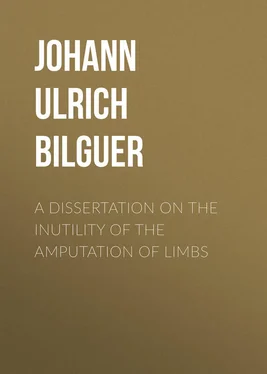Johann Bilguer - A dissertation on the inutility of the amputation of limbs
Здесь есть возможность читать онлайн «Johann Bilguer - A dissertation on the inutility of the amputation of limbs» — ознакомительный отрывок электронной книги совершенно бесплатно, а после прочтения отрывка купить полную версию. В некоторых случаях можно слушать аудио, скачать через торрент в формате fb2 и присутствует краткое содержание. Жанр: foreign_language, foreign_antique, foreign_prose, на английском языке. Описание произведения, (предисловие) а так же отзывы посетителей доступны на портале библиотеки ЛибКат.
- Название:A dissertation on the inutility of the amputation of limbs
- Автор:
- Жанр:
- Год:неизвестен
- ISBN:нет данных
- Рейтинг книги:4 / 5. Голосов: 1
-
Избранное:Добавить в избранное
- Отзывы:
-
Ваша оценка:
- 80
- 1
- 2
- 3
- 4
- 5
A dissertation on the inutility of the amputation of limbs: краткое содержание, описание и аннотация
Предлагаем к чтению аннотацию, описание, краткое содержание или предисловие (зависит от того, что написал сам автор книги «A dissertation on the inutility of the amputation of limbs»). Если вы не нашли необходимую информацию о книге — напишите в комментариях, мы постараемся отыскать её.
A dissertation on the inutility of the amputation of limbs — читать онлайн ознакомительный отрывок
Ниже представлен текст книги, разбитый по страницам. Система сохранения места последней прочитанной страницы, позволяет с удобством читать онлайн бесплатно книгу «A dissertation on the inutility of the amputation of limbs», без необходимости каждый раз заново искать на чём Вы остановились. Поставьте закладку, и сможете в любой момент перейти на страницу, на которой закончили чтение.
Интервал:
Закладка:
The cutting off a limb being the severest means employed in surgery for the relief of mankind, an operation which every one beholds with horror, I cannot, I imagine, more effectually accomplish my design, or do a greater service, than by demonstrating, that the cases wherein amputation is necessary, are much less frequent than has been hitherto supposed, and that it may even be almost totally dispensed with .
SECT. II
My first thoughts on this subject arose from observing what passed under my own inspection in the military hospitals.
In the first place I remarked, that in a very great number of cases, where amputation was judged necessary by the physicians and surgeons of the army, and even by the wounded themselves, in order to preserve life, it seldom or almost never answered the end.
In the second place, I saw and had under my immediate care, a great number of patients whose limbs had been carried off by cannon balls, and in such a manner too, that all those who adhere to, and are afraid to deviate from established rules, would have performed a fresh amputation on the remaining stumps, whom I cured, as far as they were capable of being cured, without having recourse to such disagreeable means.
And lastly; many others, whose limbs were not intirely separated off, but so much detached, wounded, shattered and contused, that the ablest surgeons deemed it necessary to take them wholly off, were nevertheless, by my endeavours, contrary to the general opinion, cured without amputation.
SECT. III
This success, partly owing to the efforts of nature, and partly to the means employed by art, strongly encouraged me almost never to have recourse to amputation, but to try every kind of remedy, internal as well as external, calculated to preserve the lives as well as the limbs of the unfortunate sufferers. My first attempts, so far from being unfavourable, confirmed me more and more in the opinion, that parts which have sustained the most considerable injuries, will much oftener get well than what is commonly believed: And although this opinion does not seem to be countenanced by many eminent physicians and surgeons; although I do not flatter myself I shall be able to induce them to alter their sentiments, I hope nevertheless, that some others, encouraged by my example, and this account of my success, will have the courage to follow the same method, and that their authority may afterwards contribute to convince the most incredulous.
SECT. IV
But supposing, what I do not apprehend can be the case, that all the gentlemen of the profession should agree in declaring my method absolutely useless, the rest of mankind at least, will be obliged to me for my endeavours to mutilate the wounded as little as possible; as most people are shocked at the mention of any amputation, or at the sight of a poor creature who has lost an hand, an arm, a foot or leg, wretchedly crawling along upon crutches or a wooden leg; and consider the total privation of a limb, as a much greater misfortune than when it is preserved, though perhaps unshapely, and uncapable of performing several of its primitive functions. If one reflects how much every body dreads the pain occasioned by the slightest incision, he will easily conceive the degree of horror a person must feel at the thought of amputation, and why many patients chuse rather to die than to submit to it 2 2 I would not chuse to lay much stress on this argument; for if one weighs the circumstances of pain, the amount of what the patient suffers from the treatment necessary for saving the limb, will often be equal to that arising from amputation. But the two strongest reasons for prefering Mr. Bilguer's method is, the saving the limb as well as the life of the patient; the loss of which is often occasioned by amputation, but never by the pain of an incision. It is also true, that pain when slighter, though longer continued, is more easily supported by the patient. Tissot.
. Hence it is so uncommon to find men, like count Mansfeld, so famed in the war that lasted thirty years, who caused his wounded arm to be taken off amidst the sound of trumpets and beating of drums; or like the country fellow, whom Dr. Schaarschmid, late an eminent physician at Berlin, mentions in his collection of observations and remarks on physic and surgery, who cut off his own mortified leg with a saw, very unfit for such an operation 3 3 To these instances may be added, that of the son of Thomas Koulichan, a captain in the Austrian service, who, being wounded in the leg, and the bones shattered, in one of the latter battles of the war, held a candle with one hand and extracted the splinters with the other. He exhibited many other proofs, not only of courage in the field, but also of that fortitude in bearing pain which is very different from the other, and much more seldom met with. Tissot.
.
SECT. V
But lest I should be charged with being weakly influenced by the cries of the patient, and with wanting that kind of fortitude which Celsus 4 4 Celsus de re medica , l. 7. præf. Nevertheless Mr. Dionis, in his course of operations, ( Demonstr. 2, Art. 9. ) acknowleges, that even the most intrepid surgeons tremble at the instant they are going to perform this operation. Of all the operations, says he, that which occasions the greatest horror, is the amputation of a thigh, a leg or an arm. When a surgeon is about to take off a limb, and reflects on the cruel means he must employ, he cannot help feeling a tremour, and pitying the misfortune of the poor patient, who is under a fatal necessity of being deprived, for life, of a part of his body. And in another place he says, This operation ought rather to be performed by a butcher than by a surgeon.
thinks requisite in a surgeon, in treating of this operation, I shall take it for granted that the patients are men like those I have just now mentioned, and that an inordinate desire of life, an uncommon strength of mind, religion, and other moral reasons, induce them to consider pain as nothing, when it affords them any hope of preserving life.
It is foreign to my plan to inquire who was the first who attempted this operation, or to trace the history of it in the works of the ancients. I shall only take notice, that such wounded men as recovered, after having lost a limb by some accident, without doubt, shewed the possibility, and suggested the first hint of trying this operation. Neither shall I dwell upon the various methods of performing it from the infancy of the art to the present time; they are described in other books 5 5 Memoirs of the Royal Academy of Sciences, 1732. Art. 7.
, and I do not purpose giving a compleat treatise on amputation. I shall not even touch upon what is already generally known on this subject, but as little as I possibly can: This is the best way of handling any particular point; and I hope all those who pay more regard than I do to scholastic form, will pardon my inattention to regularity of method and stile, when they are informed how much my time is engaged; others will excuse me, when they call to mind the remark of Celsus, that diseases are cured by proper remedies, not by a display of eloquence.
SECT. VI
To prove what I have advanced, I shall begin with enumerating those accidents for which amputation has been hitherto deemed necessary. I shall reduce them to six.
First, A mortification, which spreads till it reaches the bone.
Secondly, Any limb so greatly hurt, whether by fracture or dilaceration, that there is room to dread the most fatal consequences, a mortification and death.
Thirdly, A violent contusion of the soft parts, which has at the same time shattered the bones.
Читать дальшеИнтервал:
Закладка:
Похожие книги на «A dissertation on the inutility of the amputation of limbs»
Представляем Вашему вниманию похожие книги на «A dissertation on the inutility of the amputation of limbs» списком для выбора. Мы отобрали схожую по названию и смыслу литературу в надежде предоставить читателям больше вариантов отыскать новые, интересные, ещё непрочитанные произведения.
Обсуждение, отзывы о книге «A dissertation on the inutility of the amputation of limbs» и просто собственные мнения читателей. Оставьте ваши комментарии, напишите, что Вы думаете о произведении, его смысле или главных героях. Укажите что конкретно понравилось, а что нет, и почему Вы так считаете.












